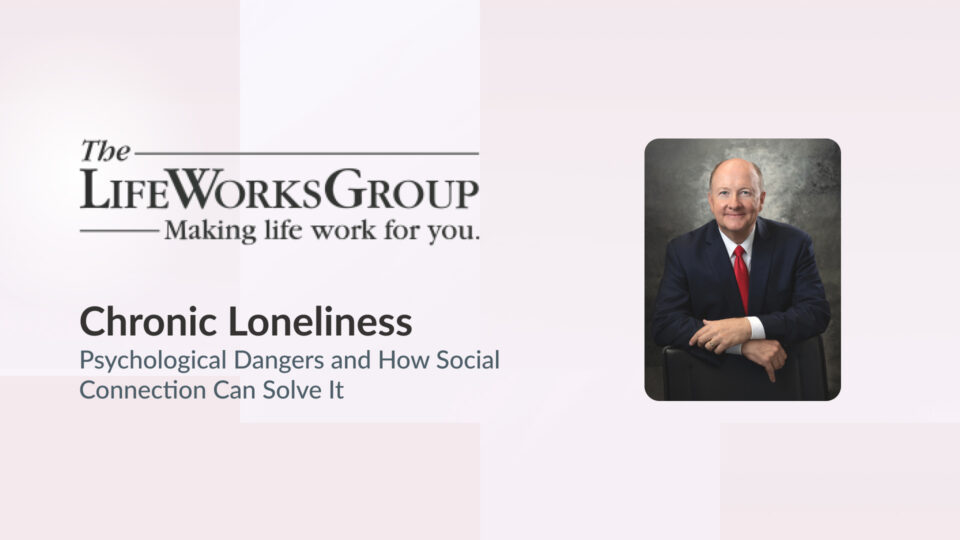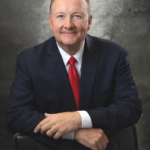Chronic Loneliness:

Chronic Loneliness:
Psychological Dangers and How Social Connection Can Solve It
- Registration Fee
- $20

- Registration Fee
- $20
Presented By
-
 Dwight Bain, LMHCMore Info
Dwight Bain, LMHCMore Info
Brought to You By
Recorded On
-
-
Location
-
On DemandSessions will be available On-Demand
80% of the adult population in the United States report loneliness as a major factor at times in their life. As loneliness builds, it can lead to low self-worth, negative emotions of resentment, bitterness, guilt, shame, interpersonal conflicts, job loss, poverty, weakened health, or mental distress. Three types of loneliness common to humans are developmental, internal, and situational. Each type affects people differently based on age, developmental stage, support system, and access to mental health care. Consider research from the National Institute of Mental Health (NIMH), Health Resources and Service Administration (HRSA), and the U.S. Census Bureau to understand how significantly loneliness has become a challenge to public health:
• Loneliness and social isolation can be as damaging to health as smoking 15 cigarettes a day
• Social isolation was associated with a 50% percent increased risk of dementia
• Two in five Americans report they feel their social relationships are not meaningful, and one in five say they feel lonely or socially isolated
• Aging adults who are socially isolated are at a higher risk for depression
• Poor social relationships were associated with a 29% increase in the risk of coronary heart disease and a 32% rise in the risk of stroke
• Social isolation significantly increases a person’s risk of premature death from all causes. A risk that may rival those of smoking, obesity, and physical inactivity
• Loneliness was associated with higher rates of depression, anxiety, and suicide
Untreated loneliness can lead to serious physical and psychological health consequences. Clinicians need to identify the challenges associated with social isolation to prevent mental health or behavioral health problems and to feel confident building new social connections.
- • Counselors
- • Addiction Counselors
- • Social Workers
- • Licensed Marriage and Family Therapists
- • Psychologists
The educational goal of this workshop is to increase knowledge about loneliness and social isolation and identify interventions to improve social connection.
At the end of this course, participants will be able to:
-
Define each primary type of loneliness: developmental loneliness, internal loneliness, and situational loneliness.
-
Identify 2 ways each type of loneliness can intensify symptoms of anxiety, depression, cumulative stress, acute stress or traumatic stress, particularly among the elderly.
-
Describe 3 factors that create social connection as a therapeutic form of intervention.
-
Identify 3 social strategies to boost confidence and social connection across generational life stages.
-
Lin S. L. (2023). The "loneliness epidemic", intersecting risk factors and relations to mental health help-seeking: A population-based study during COVID-19 lockdown in Canada. Journal of affective disorders, 320, 7–17. https://doi.org/10.1016/j.jad.2022.08.131
-
National Academies of Sciences, Engineering, and Medicine. (2020). Social Isolation and Loneliness in Older Adults: Opportunities for the Health Care System. Washington, DC: The National Academies Press. https://doi.org/10.17226/25663
-
Loneliness and Social Isolation Linked to Serious Health Conditions. (n.d.). CDC. Retrieved October 3, 2023, from https://www.cdc.gov/aging/publications/features/lonely-older-adults.html
-
New Surgeon General Advisory Raises Alarm about the Devastating Impact of the Epidemic of Loneliness and Isolation in the United States. (2023, May 3). HHS.gov. Retrieved October 3, 2023, from https://www.hhs.gov/about/news/2023/05/03/new-surgeon-general-advisory-raises-alarm-about-devastating-impact-epidemic-loneliness-isolation-united-states.html
-
Social Connection Definition | What Is Social Connection. (2023). Greater Good Science Center. Retrieved October 3, 2023, fromhttps://greatergood.berkeley.edu/topic/social_connection/definition
-
Social Isolation and Loneliness. (2021). World Health Organization. https://www.sciencedirect.com/science/article/pii/S0165032722009958
TPN.health has been approved by NBCC as an Approved Continuing Education Provider, ACEP No. 7267. Programs that do not qualify for NBCC credit are clearly identified. TPN.health is solely responsible for all aspects of the programs.
Course meets the qualifications for hours of continuing education credit for LPCCs as required by the California Board of Behavioral Sciences. TPN.health is approved by the California Association of Marriage and Family Therapists to sponsor continuing education for LPCCs. TPN.health maintains responsibility for this program/course and its content.
Trusted Provider Network, LLC is recognized by the New York State Education Department’s State Board for Mental Health Practitioners as an approved provider of continuing education for licensed mental health counselors. #MHC-0220.
This course has been approved by TPN.health, as a NAADAC Approved Education Provider, for educational credits. NAADAC Provider #198061, TPN.health is responsible for all aspects of the programming. Counselor Skill Group: Legal, Ethical and Professional Development.
TPN.health, #1766, is approved to offer social work continuing education by the Association of Social Work Boards (ASWB) Approved Continuing Education (ACE) program. Organizations, not individual courses, are approved as ACE providers. State and provincial regulatory boards have the final authority to determine whether an individual course may be accepted for continuing education credit. TPN.health maintains responsibility for this course. ACE provider approval period: 03/31/2022 – 03/31/2025. Social workers completing this course receive 1.5 continuing education credits.
Course meets the qualifications for hours of continuing education credit for LCSWs as required by the California Board of Behavioral Sciences. TPN.health is approved by the California Association of Marriage and Family Therapists to sponsor continuing education for LCSWs. TPN.health maintains responsibility for this program/course and its content.
Trusted Provider Network, LLC is recognized by the New York State Education Department’s State Board for Social Work as an approved provider of continuing education for licensed social workers #SW-0654.
Course meets the qualifications for hours of continuing education credit for LCSWs as required by the California Board of Behavioral Sciences. TPN.health is approved by the California Association of Marriage and Family Therapists to sponsor continuing education for LMFTs. TPN.health maintains responsibility for this program/course and its content.
Trusted Provider Network, LLC is recognized by the New York State Education Department’s State Board for Mental Health Practitioners as an approved provider of continuing education for licensed marriage and family therapists #MFT-0097.
TPN.health is approved by the American Psychological Association to sponsor continuing education for psychologists. TPN.health maintains responsibility for this program and its content.
-
Waiting Room Opens
-
Workshop Begins
-
Workshop Ends

